
Teaching and evaluation are the two sides of a coin. Examination cell plays a key role in evaluation part. The Examination Cell (Exam Cell) in OPJU was headed by the Controller of Examination with supporting staff. The Prime responsibility of Examination Cell is conducting of all examinations (Both Internal and External Exams) in fair and systematic manner under the directions of the Controller of Examination.
The University shall adopt the system of continuous evaluation consisting of Progress Review Examination (PRE) during the semester and End Semester Examination (ESE) for assessing the students’ performance during the programme of study. It is mandatory to appear in ESE failing which result will be declared “Failed” for that particular subject.
The University shall hold examinations for all such academic programrne as are approved by' the Academic Council and as it may notify from time to time for awarding Bachelor’s Degrees /Master’s Degrees. Under-graduate /Post-graduate diplomas, as the case may be, as per the prescribed Schemes of Teaching & Examinations and Syllabi as are approved by the Academic Council.
Examinations of the University shall be open to regular students i.e. candidates who have undergone a course of study in the University for a period specified for that programme of study in the Scheme of Teaching & Examination and Syllabi.
Provided that the Academic council may allow' any other category of candidates to take the University Examination for any specified academic programme subject to the fulfilment of such conditions as may be Laid down by the Academic Council from time to time. Provided further, that a student may be debarred from appearing in the End Semester Examination as provided in Clause 8 of this Ordinance or as provided in any other Ordinance of the University.
Each Theory Course, Laboratory Course, Project, Dissertation, Seminar etc. shall have specified credits, as indicated in the Course Scheme (For details please refer scheme of your branch/Semester/School).
Examination for Theory/Lab Courses:For each courses Evaluation procedure consists of two parts: PRE and ESE. For each Theory course the weightage of PRE (Progress Review Examination) is 50% and shall consist of two parts:
The Grading SystemFor SOE (B. Tech. /M. Tech./Diploma ), SOM ( BBA & MBA), SOS ( B.Sc. & M.Sc. )Students admitted in 2019 batch and onwards.
| Grade | Range of marks (Theory & Practical ) [PRE + ESE] |
|---|---|
| A+ | |
| A | |
| B+ | |
| B | |
| C+ | |
| C | |
| F |
| School | Theory | Practical | ||||
|---|---|---|---|---|---|---|
| PRE | ESE | TOTAL | PRE | ESE | TOTAL | |
| SOE | 30% | 30% | 40% | 30% | 30% | 40% |
| SOM | 30% | 30% | 40% | --- | --- | 40% |
| SOM | --- | --- | 40% | --- | --- | 40% |
| THEORY [OUT OF 100] | LAB [OUT OF 50 ] | ||||||
|---|---|---|---|---|---|---|---|
| ESE OUT OF [50] B MIN. MARKS 30% [15] |
TOTAL MARKS [100] A+B MIN. MARKS 40% [40] |
PRE OUT OF [30] C MIN. MARKS 30% [9] |
ESE OUT OF [20] D MIN. MARKS 30% [6] |
TOTAL MARKS [50] C+D MIN.MARKS 40% [20] |
|||
| MID SEM OUT OF[30] | TA OUT OF OUT [20] | TOTAL MARKS[50] A MIN. MARKS 30% [15] |
|||||
Note: The Grading system will remain unchanged for old batch students admitted in 2015 to 2018 Sessions where relative grading is applicable as has been followed earlier.
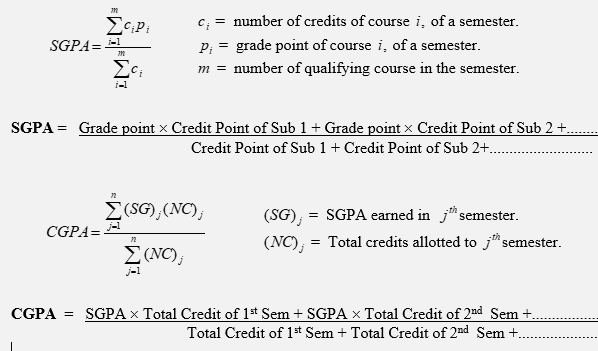
Learning by doing is the driving philosophy of the department. The Department has state of the art laboratories, latest hardware-software, round the clock internet connectivity and much more to support teaching –learning. The laboratories are well equipped with LMS system to make lab sessions and learning more effective. Following is a list of different laboratories :
Intel Intelligent Systems Lab in partenership with Intel Inc and FICE.
Android and App Devloment Lab
Cloud Computing Lab
Internet Technology Lab
Software Engineering Lab
Artificial Intelligence Lab
Mobile Computing Lab
Computer Networks and Network Security Lab
Data Structure and Programming Lab
LAMP Lab
Soft Computing Lab
Big Data Analytics & Machine Learning Lab
J2EE and Dot Net Lab
Hardware Simulation Lab
DBMS Lab
IoT Lab
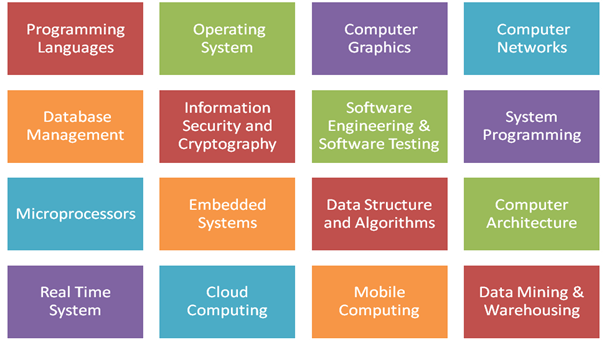
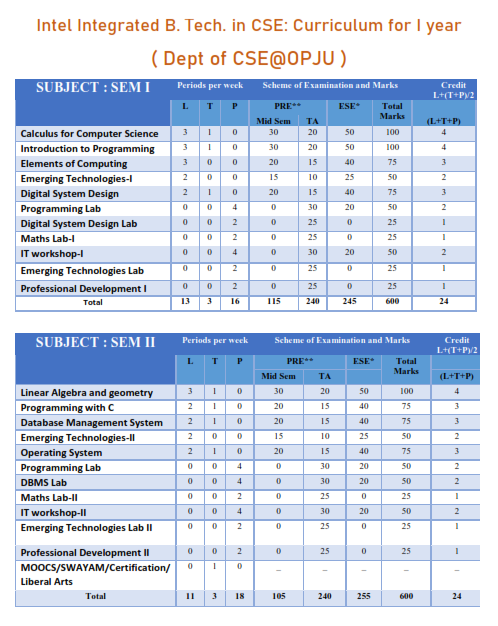
Semester - I |
|||||||||||
| S. No. | Subject Code | Board of Study | SUBJECT | Periods per week | Scheme of Examination and Marks | Credit L+(T+P)/2 | |||||
| L | T | P | PRE** | ESE* | Total Marks | ||||||
| Mid Sem | TA | (L+T+P) | |||||||||
| 1 | SOE-M-CSE101 | CSE | Advanced Mathematics | 3 | 1 | 0 | 30 | 20 | 50 | 100 | 4 |
| 2 | SOE-M-CSE102 | CSE | Advanced Data Structures and Algorithms | 3 | 0 | 0 | 30 | 20 | 50 | 100 | 3 |
| 3 | SOE-M-CSE103 | CSE | Fundamental of Data Analytics | 3 | 0 | 0 | 30 | 20 | 50 | 100 | 3 |
| 4 | SOE-M-CSE104 | CSE | Data Minining & Data Ware Housing | 3 | 0 | 0 | 30 | 20 | 50 | 100 | 3 |
| 5 | SOE-M-CSE105 | CSE | Elective 1 | 3 | 0 | 0 | 30 | 20 | 50 | 100 | 3 |
| 6 | SOE-M-CSE106 | CSE | Data Structures and Algorithms Lab | 0 | 0 | 4 | 0 | 50 | 25 | 75 | 2 |
| 7 | SOE-M-CSE107 | CSE | Data Minining & Data Ware Housing Lab | 0 | 0 | 4 | 0 | 50 | 25 | 75 | 2 |
| 8 | SOE-M-CSE108 | CSE | Data Analytics Lab | 0 | 0 | 4 | 0 | 50 | 25 | 75 | 2 |
| 9 | SOE-M-CSE109 | CSE | Elective Lab 1 | 0 | 0 | 4 | 0 | 50 | 25 | 75 | 2 |
| Total | 15 | 1 | 16 | 150 | 300 | 350 | 800 | 24 | |||
Semester - II |
|||||||||||
| S. No. | Subject Code | Board of Study | SUBJECT | Periods per week | Scheme of Examination and Marks | Credit L+(T+P)/2 | |||||
| L | T | P | PRE** | ESE* | Total Marks | ||||||
| Mid Sem | TA | (L+P+T) | |||||||||
| 1 | SOE-M-CSE201 | CSE | Next Generation Databases | 3 | 0 | 0 | 30 | 20 | 50 | 100 | 3 |
| 2 | SOE-M-CSE202 | CSE | Business Intelligent & Machine learning | 3 | 0 | 0 | 30 | 20 | 50 | 100 | 3 |
| 3 | SOE-M-CSE203 | CSE | Elective 2 | 3 | 0 | 0 | 30 | 20 | 50 | 100 | 3 |
| 4 | SOE-M-CSE204 | CSE | Elective 3 | 3 | 0 | 0 | 30 | 20 | 50 | 100 | 3 |
| 5 | SOE-M-CSE205 | CSE | Elective 4 | 3 | 0 | 0 | 30 | 20 | 50 | 100 | 3 |
| 6 | SOE-M-CSE206 | CSE | Big Data Lab | 0 | 0 | 4 | 0 | 50 | 25 | 75 | 2 |
| 7 | SOE-M-CSE207 | CSE | Databse lab | 0 | 0 | 4 | 0 | 50 | 25 | 75 | 2 |
| 8 | SOE-M-CSE208 | CSE | Machine Learning lab | 0 | 0 | 4 | 0 | 50 | 25 | 75 | 2 |
| 9 | SOE-M-CSE209 | CSE | Elective Lab 2 | 0 | 0 | 4 | 0 | 50 | 25 | 75 | 2 |
| Total | 15 | 0 | 16 | 150 | 300 | 350 | 800 | 23 | |||
Semester - III |
|||||||||||
| S. No. | Subject Code | Board of Study | SUBJECT | Periods per week | Scheme of Examination and Marks | Credit L+(T+P)/2 | |||||
| L | T | P | PRE** | ESE* | Total Marks | ||||||
| Mid Sem | TA | (L+P+T) | |||||||||
| 1 | SOE-M-CSE301 | CSE | Elective 5 | 3 | 1 | 0 | 30 | 20 | 50 | 100 | 4 |
| 2 | SOE-M-CSE302 | CSE | Internship/Project/Research | 20 | 0 | 0 | 0 | 50 | 50 | 100 | 20 |
| 3 | SOE-M-CSE303 | CSE | Seminar | 0 | 2 | 0 | 0 | 30 | 30 | 50 | 2 |
| Total | 23 | 3 | 0 | 30 | 100 | 130 | 250 | 26 | |||
Semester - IV |
|||||||||||
| S. No. | Subject Code | Board of Study | SUBJECT | Periods per week | Scheme of Examination and Marks | Credit L+(T+P)/2 | |||||
| L | T | P | PRE** | ESE* | Total Marks | ||||||
| Mid Sem | TA | (L+P+T) | |||||||||
| 1 | SOE-M-CSE401 | CSE | Elective 6 | 3 | 1 | 0 | 30 | 20 | 50 | 100 | 4 |
| 2 | SOE-M-CSE402 | CSE | Dissertation | 0 | 0 | 28 | 0 | 125 | 125 | 250 | 14 |
| Total | 3 | 1 | 28 | 30 | 145 | 175 | 350 | 18 | |||
To foster and nourish the vision and mission of the department, the department is equipped with an expanding library consisting of books on a variety of subjects concerning Computer Science and Engineering.
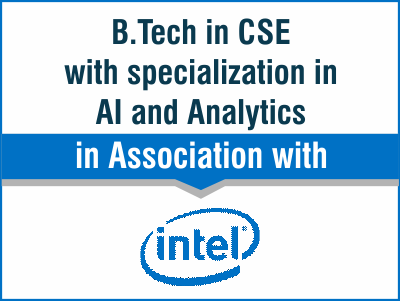
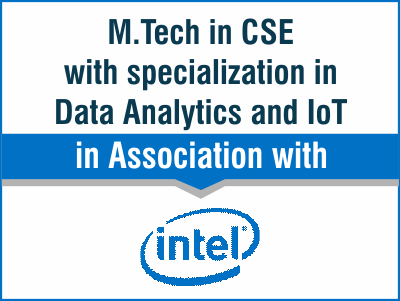
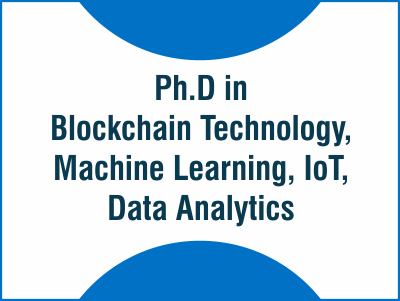
Published:
Saroj Kumar Chandra, Manish Kumar Bajpai, “Mesh Free Alternate Directional Implicit Method Based Three Dimensional Super-Diffusive Model for Benign Brain Tumor Segmentation”, Computer and Mathematics with Applications, Elsevier, Volume 77, Issue 12, 15 June 2019, Pages 3212-3223 (Impact Factor:3.370)
Saroj Kumar Chandra, Manish Kumar Bajpai, “Brain Tumor Detection and Segmentation using Mesh-Free Super-Diffusive Model”, Multimedia Tools and Applications, Springer, 27 November 2019. (Impact Factor:2.313)
Saroj Kumar Chandra, Manish Kumar Bajpai, “Fractional mesh-free linear diffusion method for image enhancement and segmentation for automatic tumor classification”, Biomedical Signal Processing and Control, Volume 58, April 2020, 101841. (Impact Factor:3.137)
Saroj Kumar Chandra, Manish Kumar Bajpai, “Efficient Benign Brain Tumor Segmentation Using Three-Dimensional Super-Diffusive Process in Frequency Domain”, The European Physical Journal Plus, 135, 419, May 2020. (Impact Factor:3.228)
Saroj Kumar Chandra, Manish Kumar Bajpai, “Fractional Crank-Nicolson Finite Difference Method for Benign Brain Tumor Detection and Segmentation”, Biomedical Signal Processing and Control, Volume 60, July 2020, 102002, (Impact Factor:3.137)
Avaneesh Singh, Saroj Kumar Chandra, Manish Kumar Bajpai, “Study of Non-Pharmacological Interventions on COVID-19 Spread”, Computer Modeling in Engineering & Sciences, December 2020. (Impact Factor:0.805)
Saroj Kumar Chandra, Manish Kumar Bajpai, “Fractional Model with Social Distancing Parameter for Early Estimation of COVID-19 Spread”, Arabian Journal of Science and Engineering, Jun 2021. (Impact Factor:1.711)
Saroj Kumar Chandra, Manish Kumar Bajpai, “Fractional Anisotropic Diffusion Model for Image Smoothing”, 8th International Conference on Modeling, Simulation and Applied Optimization (ICMSAO), Bahrain, April 2019.
Saroj Kumar Chandra, Manish Kumar Bajpai, “Finite Difference Method Based Super-Diffusive Model for Benign Brain Tumor Segmentation”, 8th International Conference on Modeling, Simulation and Applied Optimization (ICMSAO), Bahrain, April 2019.
Saroj Kumar Chandra, Manish Kumar Bajpai, “Two sided implicit Euler based super diffusive model for Benign tumor segmentation”, IEEE TENSYMP, India, Jun 2019.
Saroj Kumar Chandra, Manish Kumar Bajpai, “Effective algorithm for benign brain tumor detection using fractional calculus”, IEEE TENCON, South Korea, October 2018.
Saroj Kumar Chandra, Manish Kumar Bajpai, “Fractional Anisotropic Diffusion for Image Denoising”, IACC, India, December 2018.
Dharmendra Kumar Sharma, Saroj Kumar Chandra, Manish Kumar Bajpai, “Image Enhancement Using Fractional Partial Differential Equation”, International Conference on Advanced Computational and Communication Paradigm (ICACCP), India, March 2019.
Amit Kumar Kar, Saroj Kumar Chandra, Manish Kumar Bajpai, “Parallel GPU Based Offline Signature Verification Model”, INDICON, India December 2019.
Muthineni Shireesha, Gargi Yadav, Saroj Kumar Chandra, Manish Kumar Bajpai, “Image Reconstruction Using Deep Convolutional Neural Network”, AISP, India, January 2020.
Saroj Kumar Chandra, Abhishek Shrivastava, Manish Kumar Bajpai, “Three-Dimensional Fractional Operator for Benign Tumor Region Detection”, Machine Vision and Augmented Engineering (MAI-2021), India, February 2021.
Saroj Kumar Chandra, Avneesh Singh, Manish Kumar Bajpai, “Mathematical Model with Social Distancing Parameter for early estimation of COVID-2019 Spread., Machine Vision and Augmented Engineering (MAI-2021), India, February 2021.
Saroj Kumar Chandra, Ashok Bhansali, “CNN Based Architecture for Automatically Detecting Peoples without Face Mask, Emerging Trends in Industry 4.0 (ETI-2021), India, May 2021.
Shrivas, M. K., Anyimah, S., Badu, J. & Yeboah, T., 2017. Users' Consciousness and Practices Regarding Smartphone Security Threats, Vulnerabilities and Security Measures: A Research in the Tarkwa-Nsuaem Municipality of the Western Region, Ghana. International Journal of Research in Computer Application and Management (IJRCM), IJRCM-Vol-7(Issue-2), pp. 17-23.
Bugre, C., Badu, J. & Shrivas, M. K., 2017. Students and Tutors Perception and Usage Influence of the World Wide Web and the Library: A Case of Dunkwa Nursing and Midwifery Training College. International Journal of Library and Information Studies (IJLIS), IJLIS-Vol-7(Issue-1), pp. 26-35.
Gyabi, M. O. & Shrivas, M. K., 2016. Data Security in Rural Banking Sector: A Case Study in Ashanti Region. International Journal of Advanced Research in Computer Science & Technology (IJARCST), IJARCST-Vol-4(Issue-2), pp. 99-106.
Attrams, I. O. & Shrivas, M. K., 2016. An Analytical System for Caesarean Section Surgical Technique through a Transverse Abdominal Incision. Emerging Trends in Management, Technology, Engineering and Science (IJMSR), IJMSR-Vol-I(Issue -2).
Banie, M. O., Shrivas, M. K. & Yeboah, T., 2016. Internet Privacy and Security Issues in Ghana. Emerging Trends in Management, Technology, Engineering and Science (IJMSR), IJMSR-Vol-I(Issue - 02).
Joseph, M., Singh, S. V. & Shrivas, M. K., 2015. mCommerce Challenges and Solutions for Developing Countries: A Case Study of Ghana. International Journal of ICT and Management (IJICTM), IJICTM-Vol-III(Issue-2), pp. 14-22.
Shrivas, M. K., Amoako, A., Boateng, S. O. & Yeboah, T., 2015. Migration Model for unsecure Database driven Software System to Secure System using Cryptography. International Journal of ICT and Management (IJICTM), IJICTM-Vol-III(Issue-2), pp. 1-9.
Ampofo, B. A., Shrivas, M. K. & Singh, S. V., 2015. Public Cloud Computing; Benefits and Risks to Users and Potential Users. International Journal of Management & Scientific Research (IJMSR), IJMSR-Vol-I(Issue-1).
Attrams, I. O. & Shrivas, M. K., 2016. An Analytical System for Caesarean Section Surgical Technique through a Transverse Abdominal Incision. Emerging Trends in Management, Technology, Engineering and Science (IJMSR), IJMSR-Vol-I (Issue -2).
Banie, M. O.-., Shrivas, M. K. & Yeboah, T., 2016. Internet Privacy and Security Issues in Ghana. Emerging Trends in Management, Technology, Engineering and Science (IJMSR), IJMSR-Vol-I (Issue - 02).
Bugre, C., Badu, J. & Shrivas, M. K., 2017. Students and Tutors Perception and Usage Influence of the World Wide Web and the Library: A Case of Dunkwa Nursing and Midwifery Training College. International Journal of Library and Information Studies (IJLIS), IJLIS-Vol-7(Issue-1), pp. 26-35.
Gyabi, M. O. & Shrivas, M. K., 2016. Data Security in Rural Banking Sector: A Case Study in Ashanti Region. International Journal of Advanced Research in Computer Science & Technology (IJARCST), IJARCST-Vol-4(Issue-2), pp. 99-106.
Hiran, K. K., Henten, A., Shrivas, M. K. & Doshi, R., 2018. Hybrid EduCloud Model in Higher Education: The case of Sub-Saharan Africa, Ethiopia. Accra, Ghana, IEEE, pp. 1-9.
Joseph, M., Singh, S. V. & Shrivas, M. K., 2015. mCommerce Challenges and Solutions for Developing Countries: A Case Study of Ghana. International Journal of ICT and Management (IJICTM), IJICTM-Vol-III(Issue-2), pp. 14-22.
Shrivas, M. K., Amoako, A., Boateng, S. O. & Yeboah, T., 2015. Migration Model for unsecure Database driven Software System to Secure System using Cryptography. International Journal of ICT and Management (IJICTM), IJICTM-Vol-III(Issue-2), pp. 1-9.
Shrivas, M. K., Anyimah, S., Badu, J. & Yeboah, T., 2017. Users' Consciousness and Practices Regarding Smartphone Security Threats, Vulnerabilities and Security Measures: A Research in the Tarkwa-Nsuaem Municipality of the Western Region, Ghana.. International Journal of Research in Computer Application and Management (IJRCM), IJRCM-Vol-7(Issue-2), pp. 17-23.
Shrivas, M. K., Boasiako, A. B., Krishanan, S. & Yeboah, T., 2016. Enhanced Simplified Symmetric Key Encryption Algorithm. Texila International Journal of Academic Research (TIJAR), TIJAR-Vol-3(Issue-2), pp. 42-68.
Shrivas, M. K. & Singh, S. V., 2014. Added Advanced Encryption Standard (A-AES): With 512 Bits Data Block and 512,768 and 1024 Bits Encryption Key. International Journal of ICT and Management, IJICTM-Vol-II(Issue-1), pp. 65-71.
Shrivas, M. K. & Singh, S. V., 2015. Implementing ADDED ADVANCED ENCRYPTION STANDARD (A-AES) to Secure Data on the Cloud. International Journal of ICT and Management, IJICTM-Vol-III(Issue-1), pp. 17-24.
Shrivas, M. K. & Yeboah, T., 2017. A Critical Review of Cryptocurrency Systems. Texila International Journal of Academic Research (TIJAR), TIJAR-Vol-4(Issue-2), pp. 116-131.
Shrivas, M. K. & Yeboah, T., 2019. The Disruptive Blockchain: Types, Platforms and Applications. Texila International Journal of Academic Research (TIJAR), TIJAR- SPECIAL EDITION(April'2019/2), pp. 17-39.
Shrivas, M. K., Yeboah, T. & Brunda, S. S., 2020. Hybrid Security Framework for Blockchain Platforms. Raipur, India, IEEE, pp. 339-347.
Shrivas, M. K., Yeboah, T. & Brunda, S. S., 2020. The Disruptive Blockchain Security Threats and Threat Categorization. Raipur, India, IEEE, pp. 327-338.
Panigrahi, L., Verma, K., & Singh, B. K. (2019). Evaluation of Image Features Within and Surrounding Lesion Region for Risk Stratification in Breast Ultrasound Images. IETE Journal of Research, 1-12. SCI, Impact factor: 1.125, Citation: 1.
Panigrahi, L., Verma, K., & Singh, B. K. (2019). Ultrasound image segmentation using a novel multi-scale Gaussian kernel fuzzy clustering and multi-scale vector field convolution. Expert Systems with Applications, 115, 486-498. SCI, Impact factor: 5.452, Citation: 33.
Panigrahi, L., Verma, K., & Singh, B. K. (2018). Hybrid segmentation method based on multi-scale Gaussian kernel fuzzy clustering with spatial bias correction and region-scalable fitting for breast US images. IET Computer Vision, 12(8), 1067-1077 (DOI-10.1049/iet-cvi.2018.5332), SCI, Impact Factor: 1.648, Citation: 5.
Singh, B. K., Verma, K., Panigrahi, L., & Thoke, A. S. (2017). Integrating radiologist feedback with computer aided diagnostic systems for breast cancer risk prediction in ultrasonic images: An experimental investigation in machine learning paradigm. Expert Systems with Applications, 90, 209-223, SCI, Impact Factor: 5.452, Citation: 18.
Panigrahi, L., Das, K., & Mishra, D. (2014). Missing value imputation using hybrid higher order neural classifier. Indian Journal of Science and Technology, 7(12), 2007, Scopus, Citation: 7.
Many students in India and abroad choose to study Computer Science because of the bright career prospects. Students studying this discipline learn technical skills such as programming, problem-solving, leadership, and many more. From schools to hospitals and financial companies, computer science has its role everywhere. With the high demand of computer science and technology in the industry, B.Tech Computer Science and Engineering courses have gained potential which land students in various positions- Systems Analyst, Web Developer, Finance Programmer, Software Engineer, Product Manager, Game Developer, and many more.
Benefits of Studying Computer Science & Engineering
Unique Industry Linked Curriculum for CSE from the very first year with stress on "Learning by Doing". New curriculum has got 40 % Theory and 60% Practicals. (Find attached - First year curriculum)
Each semester has a subject related to AI and Analytics and will be taught by Intel Partner trainer. Physical classes of one week (40 hrs) will be followed by online mentoring and hands-on practice/projects/case studies.
At the end of each semester students will appear for a certification exam and will be awarded with the Intel certification for the said course.
Provision for Internships / case studies in every year and entire final year is meant for projects/Internships.
Introduction of High Growth Industry Domains as Elective Theory and Labs for better Internship opportunities like BFSI, Retail Management, Digital Marketing etc.
Introduction of MOOCS, Interdisciplinary Sciences, Entrepreneurships etc for personality development and pursuing passion.
OPJU will set-up an Intel Center of Excellence for Industry 4.0 and will establish an Intel High Performance Computing Lab. This will help in live projects and research related to AI, ML, Analytics, Big Data, Blockchain etc.
Students will get an opportunity to participate in various national / international events conducted by Intel partners.
Intel Education partner FICE will help students get access to long term internships in partner companies.
Specialization on cutting edge technology like Data and Analytics and IoT to make them industry Ready.
The curriculum covers areas that prepare students for most lucrative careers in the space of Data Science, Data Engineering and Advanced Analytics, IoT.
Contact-less and safe Online study materials, exams facility and mentoring.
Curriculum has been developed with the orientation towards industry 4.0 and smart manufacturing.
OPJU will set-up an Intel Center of Excellence for Industry 4.0 and will establish an Intel High Performance Computing Lab. This will help in live projects and research related to AI, ML, Analytics, Big Data etc.
The Dissertation/Project in the final semester enables students to apply concepts and techniques learnt during the programme
Assured industry internship/placements in various MNCs during final year
Certified course on latest technology like Big Data Analytics, Cloud Technology, Machine Learning, IoT in association with companies like Intel, Microsoft,IBM etc.
The Department’s Teaching Learning aims at enabling students to face real-world challenges using Problem-Based Learning (PBL), interactive and participative processes and constant mentoring.
NPTEL Student Chapter
ACM Student Chapter
IEEE student Chapter
CSI student chapter
UNICODE (Union of Computer Department for Excellence)
Android Club
IUCEE (Indo Universal Colloboration for Engineering Education)
Industry Visits
Programming and Problem-solving Contests
Projects and Quiz Competitions
Students Seminars and Debates
Interviews and Group Discussions
Team-building Exercises
O2C2 (OPJU Open Coding Competetion)
Webinar Conductions
In house Training program
Department researchers are working extensively in some of the thrust areas like Digital Image Processing, Data Science, Machine Learing, Cloud Computing, IoT etc. . Department has collaborated with leading Industries and renowned institutes across the India. Students along with the teachers constantly involved in exciting and interesting problems/projects to explore and innovate new methods and finding sustainable solutions, published in various national and international journals.
Key Research Area:
Big Data
Internet of Things
Cloud Computing
Network Security
Machine Learning
Digital Image Processing
A webinar was conducted by alumnus of CSE department on 20/10/2020 at 5 PM under the OPJU-IEEE student chapter. Five students of the 2020 batch successfully placed in top-notch software companies viz. Raj Kapish Gupta(TCS), Aman Patel(TCS and Wipro), Thakur Rupak Singh(IBM and TCS), Kanishk(Wipro), Vinit(Wipro), mentored junior students about technical and interview skills required to crack a placement exam and gave them tips for entry into a good software company. It was a fruitful session where students from final year and pre-final year found the session informative for their upcoming placement drives.
OP Jindal University Raigarh in association with IEEE Bombay Section conducted "OPJU IEEE Tech Web Series" a series of webinars with the aim to connect industry professionals, academia and students together to get an insight of the future technological trends. The series was presided over by eminent invitee speakers viz. Dr. Ashutosh Dutta from Johns Hopkins University, Dr. Ravi Prakash from University of Texas at Dallas, Dr. Xavier Fernando from Ryerson University, Canada, Dr. PS Bokare, Dr. Saraju Mohanty from University of North Texas, USA, Mr. Mrityunjay Singh from Infosys, Mr. Saurabh Ganeriwala from Jindal Group, Mr. Atul Arya from Panasonic, Mr. Bhavesh Kumar from SIMULIA, Mr. Raghunandan Bokare from OakNorth Bank, Bengaluru, Mr. Kanishk Gaur from India Future Foundation, Gurugram on upcoming topics in technology. We received huge participation in these webinars from across the country and abroad.
The CSE Department successfully conducted zonal level competition at University in which 4 out of 6 teams selected for participation in idea submission for final round.
The faculty of CSE department conducted various short-term trainings for students and faculty on Machine Learning and Python for Data Analytics. A training program for students on Machine Learning was conducted by Prof. Manish Bhagwani in the month of June and a short-term FDP was conducted by Dr. Gurveen Vaseer on Python for Data Analytics in the month of July. The learners were appraised of these upcoming technologies with hands-on learning.